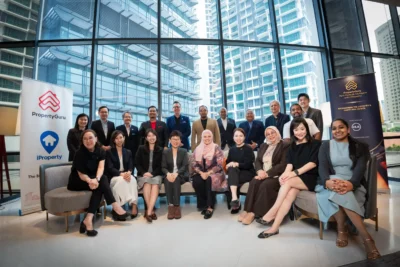Identifying real estate investment opportunities post-pandemic
Premier industry experts also share an overview of the first quarter of the year, as well as brief market forecasts

The world as we know it doesn’t have a playbook handy for the pandemic, which is why policymaking around the globe has gone into overdrive, revealed the co-managing partner at BDO Thailand Paul Ashburn at the Asia Real Estate Reboot webinar last 30th of April.
To address the public health crisis and assist its citizens, local governments across affected countries have been approving stimulus packages for at least three times. As a result, Paul said that “it had a very abrupt impact in the space of a few months on the world economy as businesses closed down, people started working from home, authorities mandated travel restrictions, and so on.”
Since everyone is still uncertain about the impact of the pandemic on the world economy, most fear the coming of a deep global recession.
In response to this, Lloyd Lee, the managing partner at YOO Capital who was also a speaker at the Asia Real Estate Reboot, said that their investment firm has already noticed investors clutching on to safety nets.
“If you look throughout the inquiries that you’re getting in Asia, it would not surprise me to find out that Singapore is one of those markets that is probably getting more inquiries today than other markets, which are considered emerging,” he presumed.
According to him, investors these days are, unsurprisingly, looking for countries with fewer risks. “They are not looking for excessive returns, they are really looking to preserve capital, create yield and benefit and not feel like they’re taking undue risk in an uncertain market.”
To guide investors in their decision-making process, he shared with us four aspects to focus on to identify opportunities post-COVID-19 outbreak:
1. Real estate fundamentals
Investors must learn to separate real estate fundamentals from COVID-specific fundamentals, particularly since this downturn was not caused by a real estate component, banking or others, but by a biological factor.
“We need to make sure that we figure out what we think is going to happen with COVID-19 not just today, not just tomorrow, but over the medium term. We also have to remember that in the end, we’re all investors and investors have to invest based on fundamentals,” explained Lloyd.
Recently, their firm has witnessed investors base their decisions with what has happened in the last 60 to 90 days. Most of them have resorted back to the day trading mentality where they question if they can get back into the investment market, if the economy is already under recession, if the prices have gone down or if they have gone up, or if there will be a J-curve recovery.
However, he said that they have begun to overlook the fundamentals, which questions how the demand or supply is, what are the interest rates or what people are feeling about the underlying risk of a downturn knowing that thousands or millions of businesses across the globe might be permanently shut down in 90 days.
“We need to understand the financial and actual fundamental impact by looking at the actual recession itself and what that starts to look like in terms of occupational demand,” he added.
2. Recovery curve
Investors must learn to acknowledge the recovery curve since historical events that have substantially affected the global economy could give them a clue on what they should be looking forward to. Even though every downturn and recovery are different, there are still some basic elements to watch out for.
Lloyd suggests checking where the interest rates are at, where is the unemployment, where the actual occupational demand is coming from and how that balances against existing supply. By concentrating on these areas, you will be able to get a clear picture of the recovery curve.
“You [will be able to] understand how much real estate is actually available out there and what you think the demand generators look like as they start to recover through the recession. For us, that is a particularly important part of the real estate fundamental analysis,” he added.
More: Coronavirus outbreak to further disrupt property investment sales in Thailand in 2020
3. Capital deployment
The short-, medium- and long-term priorities for capital deployment is another aspect that investors must focus on. This will be quite personal to any investor since they should be asking themselves what their priorities are, if they consider themselves as a long term investor who is looking for long term yield and not just upside, or if they are searching for opportunities where they will be driving upside and moving on repositioned assets to other long term investors.
This one is crucial because they must look carefully at their hold period, particularly since they are investing during a downturn. “Generally speaking, you have to be prepared to hold things longer because you don’t know exactly how long the recovery curve is going to be,” said Lloyd.
4. Capital structure
As an investor, he said that you must also look for a stable capital structure since “one of the things that almost always happens in a downturn is that banks ease lending or they make lending very favourable to themselves. This means that they will give you short term lending or bridge financing and are not taking the long term risk with you.”
“What we found can happen to certain investors is they borrow short and buy long. If the recovery doesn’t happen the way they think, they owe the bank the money and they haven’t actually exited the asset yet, or the asset hasn’t actually reached maturity yet — and you can get caught by that kind of thing. So creating a very stable fixed-rate capital structure is very, very important in these very, very extreme inflection points.”
More: Data centres prove to be a profitable investment in developing countries
Market forecast
For the next couple of years, Paul shared some predictions that countries in the region could implement to restabilise their economy. He said that in the recovery phase, we will be seeing more fiscal stimulus and tax relief measures. Essentially, countries will do whatever they can to get the economy back on track.
They will also be establishing tax incentives to encourage developers to shift inventory and to make real estate more cost-effective in this subdued market since there is a strong indication that investment and housing have a strong multiplier effect for the economy.
Moreover, local authorities will be relaxing restrictions on foreign investments, and there will be more collaboration with ASEAN and its close neighbours.
With these predictions in mind, Lloyd advised investors who are trying to figure out opportunities to get more returns to focus on the core markets in the next 12 to 24 months.
Within these markets, he said that you can search for any potential where you can transform value at the asset level. The idea is to choose a market that you think will offer higher levels of liquidity in the near to medium term.
The Asia Real Estate Reboot is a webinar organised by PropertyGuru Asia Real Estate Summit, in partnership with YOO Worldwide. A total of 691 participants from 37 countries participants across the world joined the one-hour web conference held last 30th of April. For further enquiries, email [email protected]. Visit the official website AsiaRealEstateSummit.com and follow our social media for upcoming live webinar announcements.
Recommended
6 reasons Bekasi is rising as Greater Jakarta’s next hotspot
One of Greater Jakarta’s rising stars is prospering, thanks to ample recreation and a contingent of desirable housing projects
6 developments driving Asia’s green real estate shift
Developers are being incentivised to push a green agenda into daring new realms
The Philippines’ LIMA Estate drives sustainable industrial growth
LIMA Estate models a citywide vision that uplifts workers while appealing to climate-conscious employers
Malaysia property market rebounds with foreign interest and growth
The nation’s property market is stirring to life, fuelled by foreign buyers and major infrastructure drives







